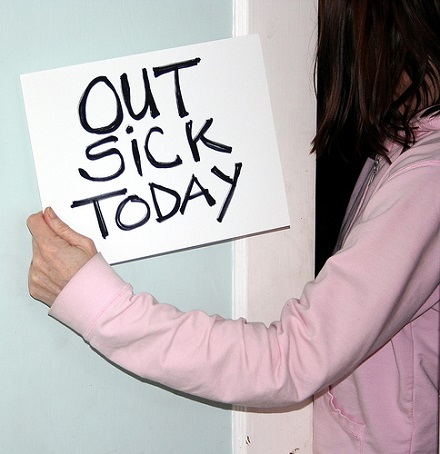Spread the love, not the germs
The one thing we all want to avoid the most, but something that none of us can dodge completely, is getting sick in college. When you’re sleeping a few feet away from a roommate, sharing restrooms with an entire hallway, and living among three hundred other co-residents, germs are bound to spread like wildfire. Dr. James M. Steckelberg of the Mayo Clinic warns that “Flu viruses travel through the air in droplets when someone with the infection coughs, sneezes or talks. You can inhale the droplets directly, or you can pick up the germs from an object and then transfer them to your eyes, nose or mouth.”
Whether suffering from a cold, the flu, or food poisoning, being under the weather is definitely no fun. College students are generally more prone to getting sick when midterms or finals roll around, because we are sleeping less and are not watching what we eat. Here are 4 ways to avoid getting sick in the first place and 4 things to do when you find yourself red-nosed and hugging a box of tissue.
4 Ways to Avoid Getting Sick:
- Wash your hands whenever possible and use hand sanitizer.
Get into the habit of washing your hands properly, and not just rinsing them, especially before meals. This is the Number One Rule for staying healthy. According to the Centers for Disease Control, human influenza viruses generally can survive on surfaces between 2 and 8 hours, so a classic soap-and-water routine remains the best method for getting rid of the germs we students frequently pick up by touching shared surfaces, including doors, sinks and elevator buttons. In addition to warding off contagions in public spaces, hand washing is a simple yet effective means of self-defense when someone who lives in close quarters to you gets sick.
- Sleep whenever you can, as much as you can.
A weakened immune system has been scientifically linked with sleep deprivation, so students who stay up all night studying will render their bodies less capable of combating infectious disease. Even obsessive hand-washers can’t completely escape exposure. When an infected person coughs, sneezes or even talks, flu viruses travel through the air in droplets, which can be inhaled directly, so it’s never a bad idea to call it an early night, or at least squeeze in a 20-minute power nap, if you haven’t been getting enough rest lately.
- Don’t share.
Sharing may be caring, but not when it comes to germs. Do not share eating utensils, food, or beverages with friends during flu season. Most of us know to avoid sharing food or drinks between friends when either one is sick or showing signs of coming down with something. It is easy to misjudge, however, when someone is on the verge of getting cold, or appears to have recovered. According to the CDC, flu symptoms may not develop for up to 4 days after a person becomes infected, and the flu is most likely to be passed to someone else from 1 day before symptoms start, up to 7 days after symptoms develop. Sharing risks passing the flu to someone you care about, before you even know you have it and after you think you’ve gotten over it.
- Eat right and stay hydrated with H2O.
Cold and flu viruses last from three to 14 days (www.healthline.com). Potentially, that could translate into two weeks of misery, so it’s worth reiterating that nutritional food boosts the immune system and arms our bodies against those micro-predators that are lurking around campus, while, eating junk food weakens our internal gladiators in times when we most need them to fight against an invisible enemy. On average, we should be drinking 64 ounces of water a day, which is equivalent to eight cups, or almost three water bottles, of water. Though coffee, soda, or juice may taste better than plain water, they promote, rather than alleviate, dehydration.
4 Things to Do If You Get Sick:
- Call the Wellness Center.
Although the Loyola Wellness Center does not take walk-ins, call them and talk to a nurse who will ask you to describe your symptoms and advise you accordingly on what to do. You don’t want to overlook something that may be more serious than it appears.
- Be prepared.
Keep a first aid kit or a box full of the basics that you could need if you do get sick. Having to trek over to CVS with a fever does not make for a fun off-campus excursion. Preparing vitamin supplements and some over-the-counter medicine ahead of time makes everything a little more bearable when you’re feeling under the weather.
- Sleep
Sleep as much as you can, all day long if necessary, so as to allow your immune system to function at optimal efficiency and replenish “good soldiers” as quickly as possible.
- Email your professors to let them know you need, or expect, to miss class.
Try not to be the student who goes to class sick and spreads the germs to everyone, including the professor. Instead, email your professors as soon as possible and ask them to excuse your absence. This is especially helpful if you are missing an important class or have a project due, because the teacher might kindly give you a mini-extension on an assignment.
Image from: http://www.emephysique.com/wp-content/uploads/2013/09/sick-day.jpg
Information from: http://www.hercampus.com/health/physical-health/5-ways-avoid-getting-sick-college
